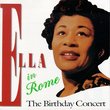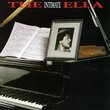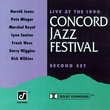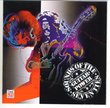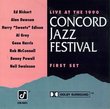| All Artists: Billie Holiday Title: Early Lady Day: 1933-1937 Members Wishing: 0 Total Copies: 0 Label: Jazz Legends Release Date: 10/7/2003 Genres: Blues, Jazz, Pop, Broadway & Vocalists Styles: Vocal Blues, Traditional Blues, Swing Jazz, Traditional Jazz & Ragtime, Vocal Jazz, Oldies, Vocal Pop, Traditional Vocal Pop Number of Discs: 1 SwapaCD Credits: 1 UPC: 723724568723 |
Search - Billie Holiday :: Early Lady Day: 1933-1937
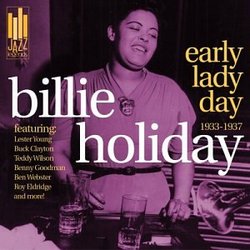 | Billie Holiday Early Lady Day: 1933-1937 Genres: Blues, Jazz, Pop, Broadway & Vocalists
|
Larger Image |
CD DetailsSimilarly Requested CDs
|
CD ReviewsBillie Holiday, Ages 18-22. Outstanding Collection! M. Allen Greenbaum | California | 10/24/2006 (5 out of 5 stars) "It's a darn good thing that Billie Holiday didn't stop with the "Your Mother's Son-in-law," the first cut on this collection of Billie Holiday from 1933-1939/ That November 1933 track gives the impression that Ms. Holiday is a singer, limited to novelty music. Although `Son-in-Law' was performed with the Benny Goodman Orchestra, this was before Goodman became the "King of Swing" --only Jack Teagarden on trombone solos Contrary to the otherwise excellent liner notes, she's not really very "recognizable," she's actually stresses the final syllables rather than the usual slur or drop-off. It's a great historical track though: It was her first recording, arranged by the man who "discovered her," John Hammond. Holiday was just 18 years old.
Skip ahead to July 1935, and, oooo-ooo-oooo, what two little years can do. The album presents records 3 classic tracks from that month with Lady Day fronting the Teddy Wilson Orchestra, comprised of such greats as Roy Eldridge (who sounds superb here), Benny Goodman, Ben Webster (tenor sax), and some ahead of its time drumming by Cozy Cole (Chu Berry replaces Webster on an October 1935 recording of "If You Were Mine.) The horn soloists are in top form, and Holiday sounds confident and swinging, sounding even more ebullient than Wilson's usual thrills and trills piano. By the time of "A Fine Romance," in September 1936, Billie Holiday is in full form, using a coarser, somewhat flatter delivery that conveys the song's ironic, downbeat lyrics perfectly. Moreover, she's fronting the "Billie Holiday Orchestra," highlighted by Bunny Berigan (trumpet), Artie Shaw (clarinet), and Cozy Coles (drums). Except for the opening number, all the tracks on performed by various permutations of either the Teddy Wilson or the Billie Holiday Orchestra. While "Lady" might sing the blues, she actually didn't perform too many numbers in a traditional blues-form. "Billie's Blues" is a little disappointing in its conventionality. Bunny Berigan gets an interesting sax growl out of his trumpet, and Artie Shaw on clarinet does little but hit some screaming high notes at the conclusion. "I Can't Give YOU Anything But Love" finds Teddy Wilson In a more decorous mood in his extended opening, but Holiday turns the song inside out, singing behind the beat, and conveying emotion with just the slightest bended note or a subtle gravelly sound. The remaining 12 tracks feature her famous, simpatico partner, trumpeter Lester Young. His soft, flowing trumpet lines complement Billie's loose flowing style, as she and Young blend together on such songs such as "This Year's Kisses," "Mean to Me" and "Foolin' Myself," lifting them to extraordinary heights. Only her more mature voice of the mid-1940's is as well regarded as this period. "I Must Have That Man," sounds more like the later Billie, her voice is more smoky/raspy as she sings the role of the woman bound to her abusive man. "Let's Call the Whole Thing Off," is a sheer delight, and Holiday seems to enjoy singing the Gershwin song. Joe Thomas replaces Young on this number. Billie how well she meshes with the band on "Mean to Me," which has Young on tenor, Johnny Hodges on alto, and Buck Clayton on trumpet. The last six cuts feature the rhythm section from the Count Basie Band (Basie was another Hammond discovery): Freddie Green (guitar), Walter Page (bass)) and Jo Jones. Most of the songs are 3 minutes or under , and they one wanting more. "Easy Living" is especially memorable, with almost continuous solo-like backing from Lester Young and clarinetist Buster Bailey. The band cooks just as much on the slightly hokey "Me. Myself, and I." The album concludes with an excellent, archetypal recording of "He's Funny That Way," featuring extended backing by Lester Young and Holiday singing with great poignancy and vulnerability. Her control, dynamics, emotional expression, and phrasing are outstanding and unmatched. This is a glorious CD with excellent sound quality, brief, not particularly well-written, but informative liner notes by Scott Yanow, personnel and recording dates for each song, and a beautiful picture of the young Billie Holiday gracing the back cover. Add some later Holiday (Yanow recommends her mid- to late-1940's Decca sides in a short bio he wrote for "The American Music Guide), and you've got the start of a decent collection." |

 Track Listings (21) - Disc #1
Track Listings (21) - Disc #1